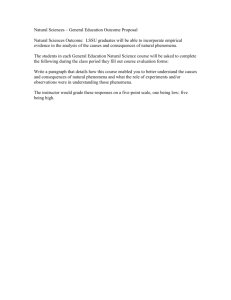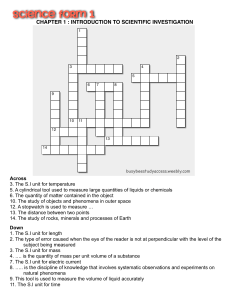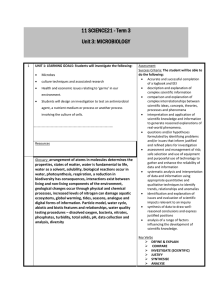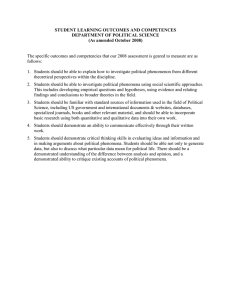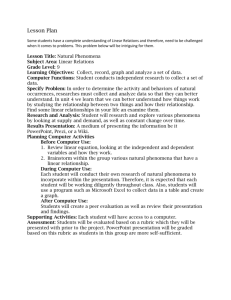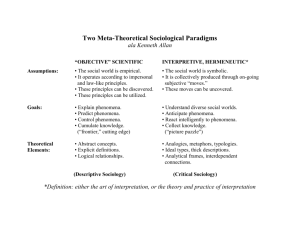Scientific Thinking: What is Science? Chapter 1 Outline
advertisement
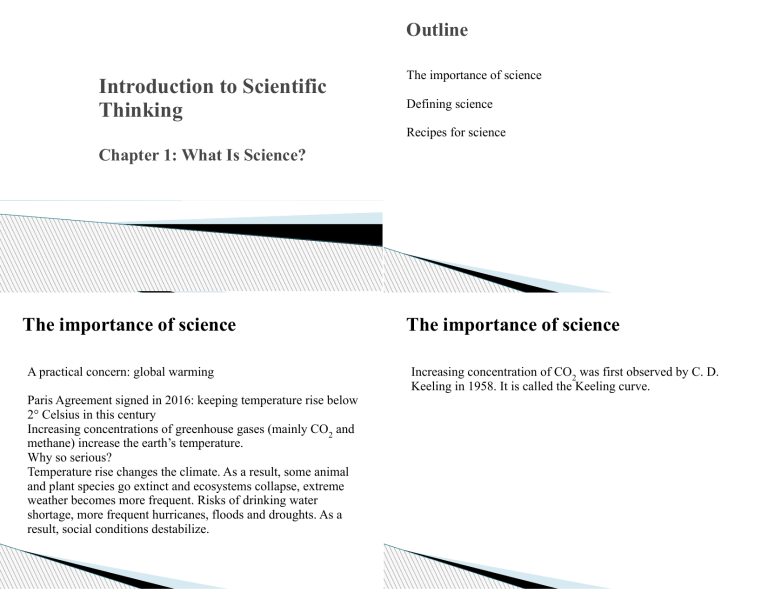
Outline Introduction to Scientific Thinking The importance of science Defining science Recipes for science Chapter 1: What Is Science? The importance of science A practical concern: global warming Paris Agreement signed in 2016: keeping temperature rise below 2° Celsius in this century Increasing concentrations of greenhouse gases (mainly CO2 and methane) increase the earth’s temperature. Why so serious? Temperature rise changes the climate. As a result, some animal and plant species go extinct and ecosystems collapse, extreme weather becomes more frequent. Risks of drinking water shortage, more frequent hurricanes, floods and droughts. As a result, social conditions destabilize. The importance of science Increasing concentration of CO2 was first observed by C. D. Keeling in 1958. It is called the Keeling curve. Chapter 1, Figure 1.2 The importance of science The Keeling Curve May 30th 2017 CO2 recording: 409.39 Human activities (mostly the burning of fossil fuels) are a major reason of rise in temperature. 410 400 CO2 concentration (ppm) 390 380 θ= 69 We know all about this because of science. Physics: How heat radiation works Physical chemistry: How CO2 in atmosphere traps heat (greenhouse effect) 370 360 350 340 Dr. Charles Keeling (1928–2005) Annual Cycle 330 320 310 θ = 44 1960 1965 1970 Jan Apr Jul Oct Jan 1975 1980 1985 1990 1995 2000 2005 2010 2015 Years recorded at Mauna Loa Observatory The importance of science Public understanding and acceptance of climate science and global warming are still poor. Understanding how science works and how it produces trustworthy knowledge are important for citizens in a democracy. The importance of science Why is science important? Limitations of science: Science aims to produce knowledge. In its traditional definition, knowledge is justified true belief. A belief is justified if you have good reasons for believing it. Justified beliefs may or may not be true. True beliefs may or may not be justified. Science cannot replace non-scientific intellectual pursuits (like literature or philosophy). Basic research: Aiming knowledge for its own sake; to explain how things work in nature Applied research: Aiming knowledge to develop products that will improve the human condition Science cannot decide by itself what should be done about climate change. In addition to scientific knowledge, political decisions are needed. Science does not deal with the supernatural or with miracles. So, science is silent with respect to theological questions. (perhaps debatable) Defining science Defining science Climatology is a science whereas astrology is not. Therefore, we should trust climatologists but not astrologists. 1. Defining science by its history: What kind of activities have been called science in the past? Why? What is science and why does it deserve our trust? Scientia: Knowledge We attempt to demarcate science from pseudoscience so that we know whom to trust as experts, what to teach in schools, which ideas about the world to take seriously, etc. Scientific revolution (1550-1700): The birth of modern science Copernicus, Galileo, Newton, etc. It is not easy to give an exceptionless definition of science. We will look at three different attempts. Defining science One defining feature of the scientific revolution is the transition from the geocentric to the heliocentric view of the cosmos. In 1543, Copernicus presented the heliocentric view. At that time, the two views were not clearly superior to each other. Research by Kepler and Galileo changed that. Kepler suggested elliptical rather than circular orbits. Using a new telescope, Galileo observed moons orbiting Jupiter, which suggested that the earth is not the centre of the cosmos around which everything orbits. Perhaps science can be defined as everything that has descended from the Scientific Revolution. Before that, the Islamic Golden Age of science (8th-13th centuries): Razi, Kharizmi, Haytham, Biruni, Ibn Sina, etc. Defining science One problem with this suggestion is that the Scientific Revolution included philosophical and theological ideas which we do not consider scientific today. During the Islamic Golden Age, science, philosophy and theology were not distinguished at all. Another problem is that disciplines such as linguistics, economics, etc. were not recognized as science during the Scientific Revolution. Both the subject natter and the methods of science today differ from those during the Scientific Revolution. Defining science Defining science 2. Defining science by its subject matter: What do scientists investigate? Natural phenomena are occurrences observable either directly or with the help of technology. One problem with this suggestion is that scientists investigate almost everything: quarks, DNA, emotions, institutions, etc. Natural explanations invoke only natural phenomena to explain other natural phenomena (methodological naturalism). What do all this subject matter have in common that is not shared by pseudoscience? Probably nothing. (Ontological naturalism: Nothing apart from natural phenomena exists.) Perhaps what distinguishes science is that it attempts to provide natural explanations to natural phenomena (unlike religion, literature or art). Supernatural phenomena are not governed by natural laws and might be unobservable. Defining science Defining science «Science cannot tell us anything about supernatural phenomena such as miracles, ghosts. They are outside the realm of science.» This is also debatable. (see also Exercise 1.16, p. 30) 3. Defining science by its methods: How do we go about doing science? Which general principles do we follow? Still, pursuit of natural explanations for natural phenomena is not something unique to science. When trying to solve a murder case, a police detective does the same thing. Scientific investigation involves empirical evidence. Evidentialism: Whether a belief is justified is determined by how well it is supported by evidence. Falsificationism: Scientific ideas are tested against evidence that might potentially refute (falsify) them. Naturalism is an essential feature of science but it is not enough to demarcate science from non-science. Defining science Defining science There are two aspects to falsificationism: Two other characteristics of scientific inquiry: i) Any scientific claim should be falsifiable. You should have an answer to the question: «What evidence, if obtained, would falsify your claim?» If no evidence could potentially falsify it, your claim is not scientific. True claims can still be falsiable: False, falsified and falsifiable are different concepts. Quantitative analysis: Using mathematical techniques to measure, describe or summarize natural phenomena ii) Any scientific claim, however plausible, should be abandoned if there is sufficient evidence that falsifies it: openness to falsification. This is related to honesty: You should accept defeat when your claim is falsified. Defining science The nature of science (see Table 1.1, p. 27): Aiming to generate knowledge (scientia) Historical basis in the Scientific Revolution Commitment to (methodological) naturalism Empirical investigation (rather than pure thinking) Evidentialism Falsifiability (claims) and openness to falsification (scientists) The use of mathematics Social structure The previous example of climate change is consistent with these features. Science has a social and institutional structure: Scientific inquiry is not an individual endeavour. Science relies on communities of many people working on similar projects. They sometimes cooperate and sometimes compete with each other. Defining science Astrology is a typical example of a pseudoscience. Its claims are usually not falsifiable because of vague predictions. Basic principles of astrology are inconsistent with well-understood phenomena in physics, biology and psychology. More recent examples of pseudoscience (or science denial) are climate change denial, anti-vaccination campaigns, and creationism and intelligent design (denial of evolutionary theory). They are inconsistent with our current scientific understanding of physics and biology. Recipes for science «The scientific method is a myth»: There is no single scientific method. Instead, there are «recipes» used by scientists. Like good cooking, good science is a highly variable and creative process. Descriptive claims: How things in fact are and why they are that way. Normative claims: How things ought to be (with reference to a norm or value). How humans actually reason, vs. How they should reason (norms of rational thinking) Recipes for science Recipes for science Flaws in human reasoning: Scientific method protects us from common flaws of reasoning Confirmation bias: We seek information that fits our beliefs and avoid information that would challenge them. Thus, we avoid the potential falsification of our favoured beliefs. Observer-expectancy effect: The scientist’s expectations unconsciously influence how the experimental subjects behave. Example: Clever Hans, investigated by Pfungst Condition 1: using blinders on Hans Condition 2: using an ignorant questioner Result: Hans cannot answer correctly; body language Recipes for science Norms of science protect us from flaws of reasoning. 2. Norms of the scientific community 1. Norms of individual investigators Science is a collaborative effort. Individual scientists and communities of science should be able to trust each other: Be trustable and trust others Plagiarism: Presenting someone else’s work (findings, ideas, etc.) without giving credit to that person, creating the impression that it is one’s own work Faking data: Presenting non-existing findings as real Conflicts of interest: Personal or financial gains can influence research findings. Any potential conflict of interest should be disclosed by the scientist: transparency But not blind trust: critical evaluation of research findings Replication: Doing the same study to see if you can get the same results Peer review: Research findings are checkef for accuracy by other scientists before they are published in scientific journals Recipes for science Methods in science: Scientific method also protects against flaws of reasoning Three steps: Formulation of hypotheses Deriving testable predictions (expectation) from hypotheses Testing predictions by comparing them to actual observations Beyond simple observations, scientists make theoretical claims about entities that are not directly observable. Theoretical claims aim to explain observable phenomena. Example: All salt dissolves in water. Recipes for science Observations: Passive observation vs. observation after intervention Example: Sage and mint leaves smell similar unless you crush them. Intervention requires doing an experiment: Chapter 2 Recipes for science Science is concerned with a special kind of claim called a hypothesis. It is a guess about what the world is like. It is not yet known whether it is true, so it needs to be tested. Hypotheses may be formulated before any observations are made using imagination, or they can be formulated on the basis of preliminary evidence or background knowledge. Expectations (predictions): What should we observe if the hypothesis is true? Example: What should we observe through the telescope if there is a black hole over there? (A black hole cannot be directly observed.)
